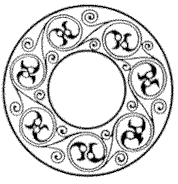Corrigan, Karen (Newcastle-Upon-Tyne)
For-to Infinitives and Beyond: Interdisciplinary Approaches to Non-Finite Complementation in a Rural Celtic EnglishFiess, Astrid (Potsdam)
Do be or not do be - generic/habitual forms in East Galway English
Filppula, Markku (Joensuu)
More on the English Progressive and the Celtic Connection
German, Gary (Brest)
The Link between Breton French and Celtic Englishes
Hamer, Andrew (Liverpool)
Vowel Lengthening in Manx English
Härke, Heinrich (Reading)
Population Replacement or Acculturation? An Archaeological Perspective on Population and Migration in Post-Roman Britain
Heinecke, Johannes (Lannion)
The temporal and aspectual system of English and Welsh
Hickey, Raymond (Essen)
What's cool in Irish English? Linguistic change in Dublin
Huber, Magnus (Regensburg)
The Corpus of English in South-East Wales and Its Synchronic and Diachronic Implications
Isaac, Graham (Aberystwyth)
Diagnosing the symptoms of Contact: Some Celtic - English case histories
Kirk, John (Belfast)
The Grammar of Northern Irish English
Klemola, Juhani (Helsinki)
Personal pronouns in the traditional dialectsof the South West of England
Mac Mathúna, Liam (Dublin)
Irish shakes its head?
Code-mixing as a textual responseto the rise of English as a societal language in Ireland
McCafferty, Kevin (Tromsø)
Acts of disunity? Change in (London)Derry English
Poppe, Erich (Marburg)
The Celticity of Standard English Revisited
Ronan, Patricia (Maynooth)
Periphrastic Constructions in Old Irish
Sand, Andrea (Freiburg i.Brsg.)
Some Properties of the Noun Phrase in the Celtic Englishesand other Contact Varieties of English
Shorrocks, Graham (St. Johns NFL)
Irish-Influenced Varieties of Newfoundland English
Walters, Rod (Pontyprydd)
The Prosody of Rhondda Valleys English. Supra-segmental Features of a South Wales 'Valleys' Accent
White, David L. (Austin TX)
Britonnic influence in the innovations of Northern Middle English
Wmffre, Iwan (Galway)
Welsh- and Cornish-English in the early Modern Period
Williams, Malcolm (Grenoble)
Information Packaging in Rhondda Speech: a Second Look at the Research of Ceri George
Poster Show:
Pitkänen, Heli (Joensuu)
Habitual periphrastic be in Welsh English - an apparent time study
Zwickl, Simone (Heidelberg)
Language Attitudes and Identity Across the Northern Irish/Irish Border

